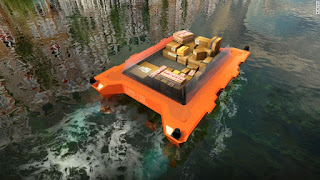Features,
Self-driving boats to be unleashed in Amsterdam
As self-driving cars begin to appear on public highways, the first autonomous boats are heading for the waterways of Amsterdam.
The "Roboat" is expected to make its maiden voyage in 2017, the product of a $27 million collaboration between the Massachusetts Institute of Technology (MIT) and the Amsterdam Institute for Advanced Metropolitan Solutions (AMS).
The cutting-edge crafts will offer a range of urban solutions from public transport to pollution sensing and water-based venues.
If trials are successful, a fleet of Roboats will soon be operating in the Dutch capital, and around the world.
Multi-function
The autonomous boats will provide an alternative, eco-friendly transport option.
"In Amsterdam, the existing infrastructure of roads and bridges is extremely busy," says Dr. Stephan van Dijk, research program manager at AMS. "We will try to shift the transport of goods and people to the waterways to get people out of their cars and reduce traffic in the city."
The boats are designed to be light and easy to maneuver, says van Dijk, so that they can quickly and easily reach all points of Amsterdam's extensive canal network, which made the city the obvious location for the project.
The design also allows boats to be connected together to form floating bridges and platforms, that could be used for purposes from disaster relief to open air concerts.
Roboats will be fitted with a battery of sensors to deliver sophisticated data on water and air quality, as well as information on pollution -- including the numerous bicycles that fall in the city's canals each year.
"Air quality measures usually come from a few places in a city that do not tell you much about human exposure," says Professor Carlo Ratti, Director of the MIT Senseable City Lab. "The next level is to monitor in a ubiquitous way with a lot of fine-grained measurement...which we can do with this platform."
The team hope this data could inform policy to improve air and water quality in Amsterdam, and eventually in countries such as India where dirty water is a deadly threat.
Future fleet
The field of self-driving boats is likely to expand in the coming years, with several companies developing new designs.
Rolls Royce has announced plans for an autonomous cargo vessel, although this has faced opposition from the shipping industry over safety and piracy concerns.
But the relatively calm waters of Amsterdam could offer the ideal proving ground for autonomous vessels, says Ajit Jaokar, who teaches "Data Science for the Internet of Things" at the University of Oxford.
"I do not see the same (safety) issues here," he says. "As with all AI applications, Roboat will get better as it navigates more waterways. Once a model is developed, it could train other boats."
Professor Ratti says the project has received interest from cities around the world, eager to apply the technology.
He also believes the system could be used with many other types of vessels to reduce fatal accidents at sea.
If the Amsterdam project is successful, the history of autonomous vehicles could receive a significant update.














0 comments: